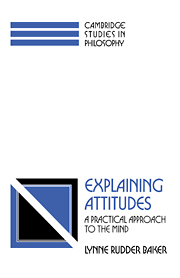4 - On standards of explanatory adequacy
Published online by Cambridge University Press: 05 June 2012
Summary
The Standard View seems to many to be so obviously correct that mere criticism may not dislodge it. Although I argue in Part I that both eliminativist and noneliminativist versions of the Standard View are beset with difficulties, I want to push farther. In Part II, I want to undercut a central motivation for the Standard View, namely, that the role of beliefs in causal explanation requires that beliefs be brain states. As is pointed out in Chapter 2, noneliminativists typically are concerned to vindicate the causal-explanatory role of belief. Even eliminativists, who deny that there are any beliefs at all, agree that belief explanations purport (albeit wrongly, they contend) to be causal explanations. If we rule out appeal to “immaterial” causes, it may seem that if beliefs have a causal-explanatory role in behavior, then they must of necessity be physically realized internal states of believers – in short, they must be brain states.
This claim – that the causal explanatoriness of belief requires that beliefs be brain states – and, with it, the motivation for the Standard View rest on a hopelessly anemic conception of causal explanation. In this chapter, I want to expose the shortcomings of the conception of causal explanation that underlies the claim. Why does the claim seem plausible? The answer, I think, is that philosophers impose certain constraints on causally explanatory properties.
- Type
- Chapter
- Information
- Explaining AttitudesA Practical Approach to the Mind, pp. 93 - 120Publisher: Cambridge University PressPrint publication year: 1995



